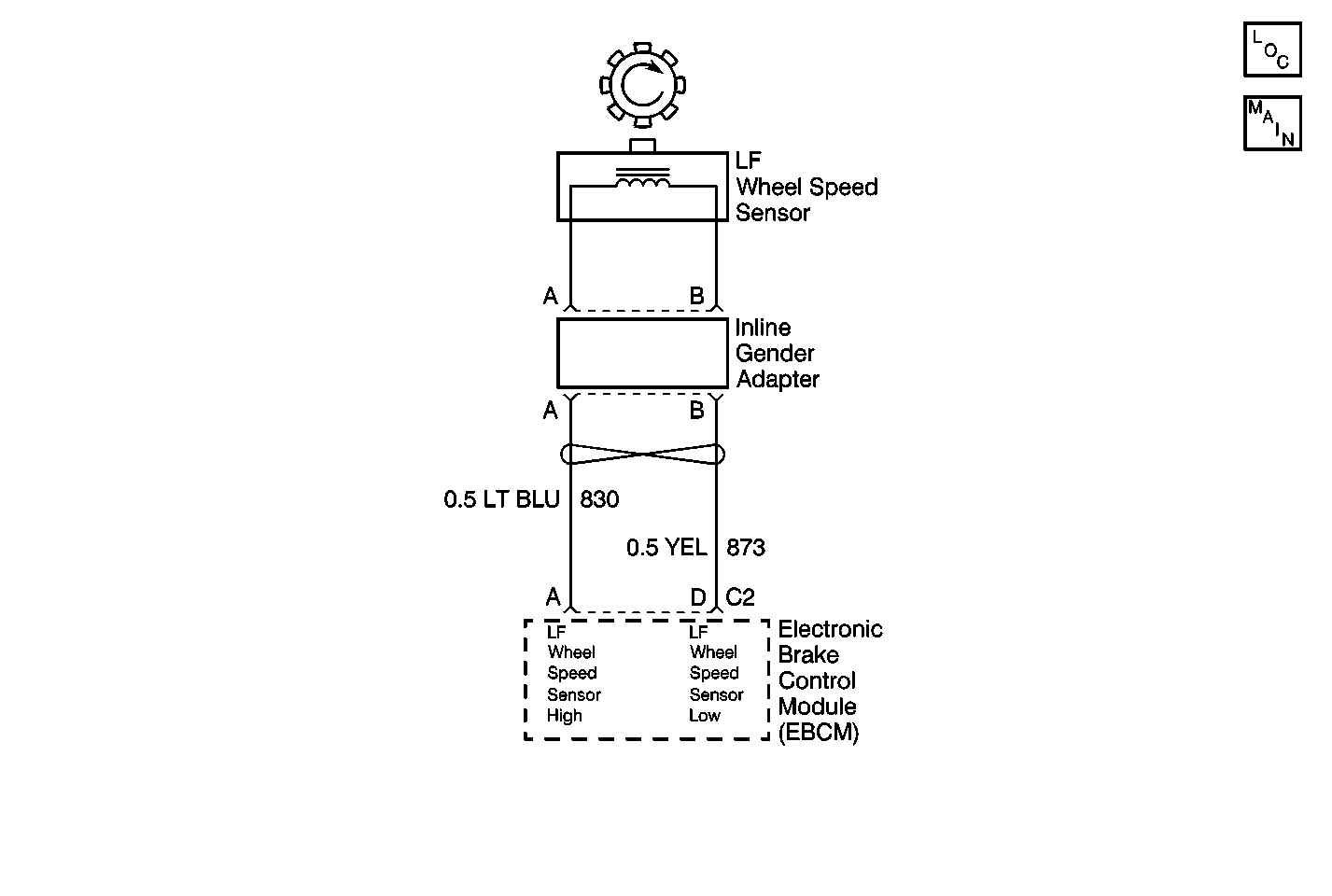| Table 1: | WSS Temperature vs. Sensor Resistance |

Circuit Description
The wheel speed sensor coil emits an electromagnetic field. A toothed ring on the wheel passes by the wheel speed sensor and disrupts this electromagnetic field. The disruption in the field causes the wheel speed sensor to produce a sinusoidal (AC) voltage signal. The frequency and amplitude of the sinusoidal (AC) voltage signal are proportional to the speed of the wheel. The amplitude of the wheel speed signal is also directly related to the distance between the wheel speed sensor coil and the toothed ring. This distance is referred to as the air gap.
Conditions for Setting the DTC
| • | The left front wheel speed is less than 6 km/h (4 mph) |
| • | All other wheel speeds are greater than 13 km/h (8 mph) |
| • | No unexpected wheel acceleration/deceleration. Anything that keeps the left front wheel speed sensor low while the vehicle is moving above 13 km/h (8 mph). |
Action Taken When the DTC Sets
| • | The ABS indicator lamp turns on |
| • | The ABS disables |
DTC C0226 is an Ignition Latched DTC, which indicates that the above actions remain true until the ignition is turned to OFF (even if the cause of the DTC is intermittent).
Conditions for Clearing the DTC
| • | Repair the conditions responsible for setting the DTC |
| • | Use the Scan Tool Clear DTCs function |
Diagnostic Aids
Any of the following conditions may cause an intermittent malfunction:
| • | A poor connection |
| • | Wire insulation that is rubbed through |
| • | A wire breaks inside the insulation |
Thoroughly check any circuitry that is suspected of causing the intermittent complaint for the following conditions:
| • | Backed out terminals |
| • | Improper mating |
| • | Broken locks |
| • | Improperly formed or damaged terminals |
| • | Poor terminal to wiring connections |
| • | Physical damage to the wiring harness |
If the customer says that the ABS indicator lamp is on only during humid conditions such as rain, snow, or vehicle wash, then thoroughly inspect all wheel speed sensor circuits for signs of water intrusion. Use the following procedure:
- Spray the suspected area with a 5% salt water solution (two teaspoons of salt to 12 oz. of water)
- Drive the vehicle above 24 km/h (15 mph) for at least 30 seconds
If the DTC returns, replace the suspected harness.
When inspecting a wheel speed sensor, inspect the sensor terminals and the harness connector for corrosion. If evidence of corrosion exists, then replace the wheel speed sensor. Refer to Wheel Speed Sensor Replacement .
Resistance of the wheel speed sensor will increase with an increase in sensor temperature. Refer to the following table for temperature/resistance values.
°C | °F | Ohms |
|---|---|---|
Temperature vs Resistance Values (Approximate) | ||
-40 to 4 | -40 to 40 | 1500-2500 |
5 to 43 | 41 to 110 | 1500-2500 |
44 to 93 | 111 to 200 | 1500-2500 |
94 to 150 | 201 to 302 | 1500-2500 |
Test Description
The numbers below refer to the steps in the diagnostic table:
-
This step checks the resistance of the left front wheel speed sensor.
-
This step checks the voltage output of the left front wheel speed sensor.
-
This step checks for a short in the wiring between the wheel speed sensor circuits.
-
This step checks for a short to ground in the left front wheel speed sensor circuit.
Step | Action | Value(s) | Yes | No |
|---|---|---|---|---|
1 | Was the Diagnostic System Check performed? | -- | Go to Diagnostic System Check | |
2 |
Can you observe physical damage? | -- | ||
Is the resistance measurement within the specified range? (Refer to the table on the previous page for applicable sensor resistance values. The values in this table are for the temperature of the sensor, not the air temperature.) | -- | |||
Is the voltage measured equal to or greater than the specified value? | 100 mV | |||
Is the resistance measurement equal to the specified value? | OL | |||
Is the resistance measurement equal to the specified value? | OL | |||
7 |
Does the DTC set as a current DTC? | -- | ||
8 | Make the necessary repairs. Is the repair complete? | -- | Go to Diagnostic System Check | -- |
9 | Replace the left front wheel speed sensor. Is the repair complete? | -- | Go to Diagnostic System Check | -- |
10 | Replace the EBCM. Is the repair complete? | -- | Go to Diagnostic System Check | -- |
11 | Repair the short between CKT 830 and CKT 873. Is the repair complete? | -- | Go to Diagnostic System Check | -- |
12 | Repair the short to ground in CKT 873. Is the repair complete? | -- | Go to Diagnostic System Check | -- |
13 | Malfunction is intermittent. Inspect all connectors for damage which may result in high resistance when all components are connected. Refer to Diagnostic aids on the facing page for more information. Repair all damage found. Is the repair complete? | -- | Go to Diagnostic System Check | -- |
